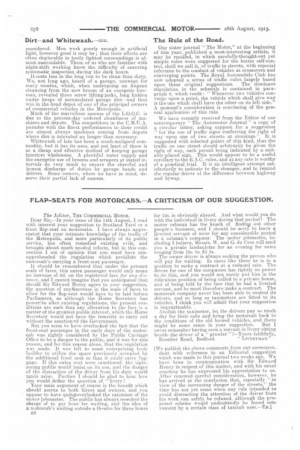FLAP-SEATS FOR MOTORCASS.—A CRITICISM OF OUR SUGGESTION.
Page 2

If you've noticed an error in this article please click here to report it so we can fix it.
The Editor, THE COMMERCIAL MOTOR.
Dear Sir,—In your issue of the 14th August, I read with interest your suggestion to Scotland Yard re a front flap-seat on motoreabs. I have always appreciated that your intimate knowledge of the traffic, of the Metropolis, and more particularly of its public service, has often remedied existing evils, and brought about much needed reform, but in this connection I am of opinion that you must have misapprehended the regulation which prohibits the motoreab's carrying a front-seat passenger. It should be remembered that under the present scale of fares, this extra passenger would only mean an increase of 6d. on the registered fare for any distance, and I cannot imagine that you anticipated that should Sir Edward Henry agree to your suggestion, the question of any4increase in the scale of fares to allow for the fia.p-seat would have to be laid before Parliament, as although the Home Secretary has powerito alter existing regulations, the present conditions are such that any alteration to the fare is a matter of the greatest public interest, which the Home Secretary would not have the temerity to carry out without the sanction 'of the Government.
But you seem to have overlooked the fact that the front-seat passenger in the early days of the motorcab NIAS rightly considered by the Public Carriage Office to be a danger to the public, and it was for this -reason, and for this reason alone, that the regulation was made. It was left to some enterprising body builder to utilize the space previously occupied by the additional front seat so that it could carry luggage. If this extra seat were sanctioned, the sightseeing public would insist on its use, and the danger .of the distraction of the driver from his duty would again arise. Further I should be glad to hear how you would define the question of " livery?
Your main argument of Course is the benefit which should accrue to both hirers and owners, and you appear to have quitekoverlooked the existence of the motor jobmaster. The public has always resented the charge of 4s. per hour for waiting, and the idea of a motoreab's waiting outside a theatre for three hours
B2
for 12s. is obviously absurd. And what would you do with the individual in livery during that period? The motor cabman has the knack of findiriig out other people's business, and I should be sorry to leave a, liveried servant of mine for any considerable period in a cabman's company. The motor jobinaster, including I believe, Messrs. W. and G. du Cros will send you a private hindaulette for an evening for sums ranging from 158. to 21 is. The owner driver is always seeking the person who will pay for waiting. In cases like these he is in a r-iosition to make a contract at a reduced rate. The driver for one of the companies has rightly no power to do this, and you would not surely put him in the ridiculous position of being called to a private house, and of being told by the fare that he had a livened servant, and he must therefore make a contract. The motorca,b company never has been able to control its drivers, and so long as taximeters are fitted to its vehicles, I think you will admit that your suggestion is impracticable. Abolish the taximeter, let the drivers pay so much a day for their cabs and bring the motorcab back to the eonditions of the old horsed vehicles, and there might be some sense in your suggestion. But I never remember having seen a servant in livery sitting beside the driver of a " growler "1—Yours faithfully, Rossiter Road, Bedford. "LIVERYMAN."
[We publish the above comments from our correspondent with reference to an Editorial suggestion which was made in this journal two weeks ago. We have been in communication with Sir Edward Henry in respect of this matter, and with his usual courtesy he has expressed his appreciation to us: After renewed careful consideration, however, he has arrived at the conclusion that, especially " in view of the increasing danger of the streets," the time has not yet come when any rule intended to avoid distracting the attention of the driver from his work can safely be relaxed, although the proposed scheme would undoubtedly be found convenient by a certain class of taxicab user.—E43.1
























